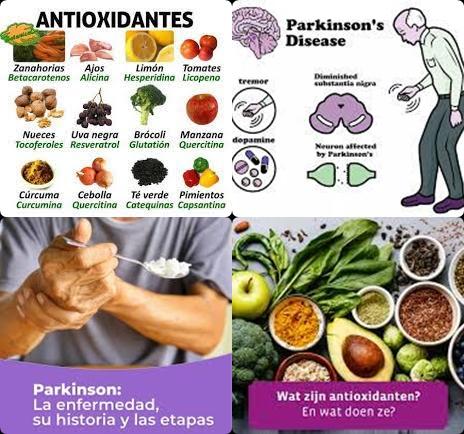
Objectives:
Does a higher intake of dietary antioxidants (like vitamin C and E, β-carotene, zinc, anthocyanins, lutein) reduce risk of Parkinson's disease (PD)?
Study design:
This review article included 6 prospective cohort studies and 2 nested case-control studies (448,737 participants with 4,654 persons with Parkinson's disease) and 6 case-control studies (1,948 persons without Parkinson's disease and 1, 273 persons with Parkinson's disease).
Results and conclusions:
The investigators found comparded to the lowest dietary vitamine E intake, that the highest dietary vitamine E intake significantly reduced risk of Parkinson's disease with 16% [pooled RR = 0.84, 95% CI = 0.71 to 0.99, n = 7 cohort studies].
Significantly means that there is an association with a 95% confidence.
The investigators found compared to the lowest dietary anthocyanins intake, that the highest dietary anthocyanins intake significantly reduced risk of Parkinson's disease with 24% [pooled RR = 0.76, 95% CI = 0.61 to 0.96, n = 2 cohort studies].
Significantly because pooled RR of 1 was not found in the 95% CI of 0.61 to 0.96. RR of 1 means no risk/association.
The investigators found compared to the lowest dietary lutein intake, that the highest dietary lutein intake significantly increased risk of Parkinson's disease with 86% [pooled RR = 1.86, 95% CI = 1.20 to 2.88, n = 3 case-control studies].
The investigators found in dose-response meta-analyses that every increment of dietary vitamin C intake with 50 mg/d significantly reduced risk of Parkinson's disease with 6% [RR = 0.94, 95% CI = 0.88 to 0.99, n = 6].
The investigators found in dose-response meta-analyses that every increment of dietary vitamin E intake with 5 mg/d significantly reduced risk of Parkinson's disease with 16% [RR = 0.84, 95% CI = 0.70 to 0.99, n = 7].
The investigators found in dose-response meta-analyses that every increment of dietary β-carotene intake with 2 mg/d significantly reduced risk of Parkinson's disease with 6% [RR = 0.94, 95% CI = 0.89 to 0.99, n = 6].
The investigators found in dose-response meta-analyses that every increment of dietary zinc intake with 1 mg/d significantly reduced risk of Parkinson's disease with 35% [RR = 0.65, 95% CI = 0.49 to 0.86, n = 1].
The investigators concluded that higher intake of antioxidant-rich foods reduces risk of Parkinson's disease. Future, well-designed prospective studies are needed to validate the present findings.
Original title:
Dietary Antioxidants and Risk of Parkinson's Disease: A Systematic Review and Dose-response Meta-analysis of Observational Studies by Talebi S, Ghoreishy SM, […], Mohammadi H.
Link:
https://pubmed.ncbi.nlm.nih.gov/35030236/
Additional information of El Mondo:
Find here more information/studies about RCTs/significant and antioxidants.